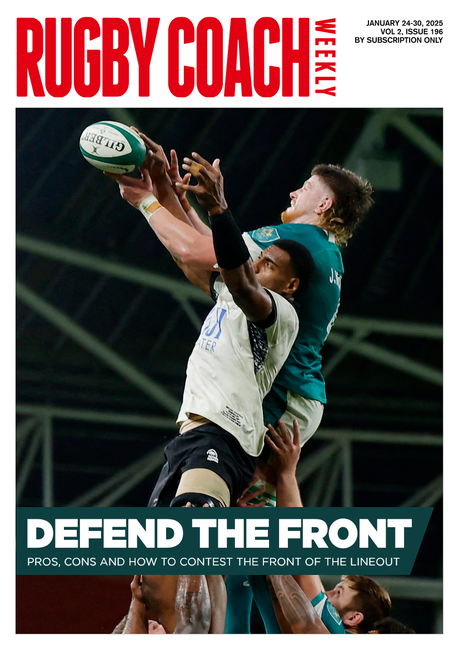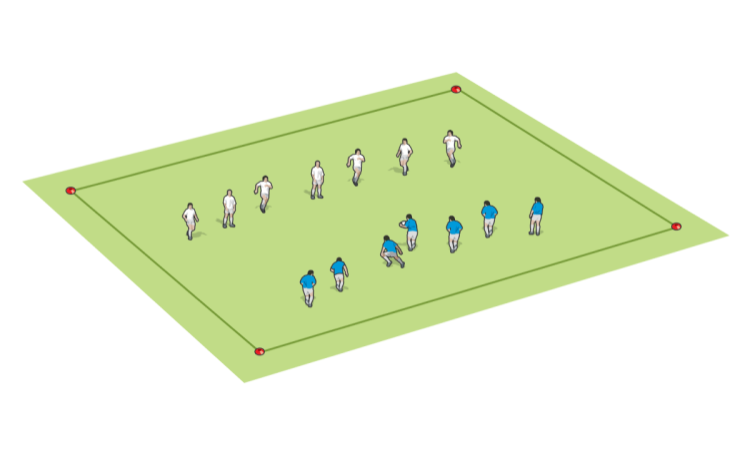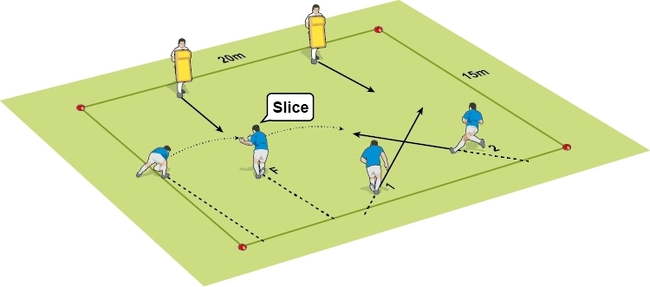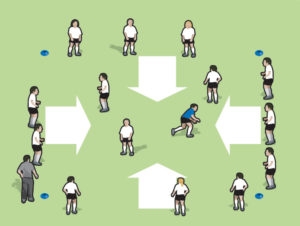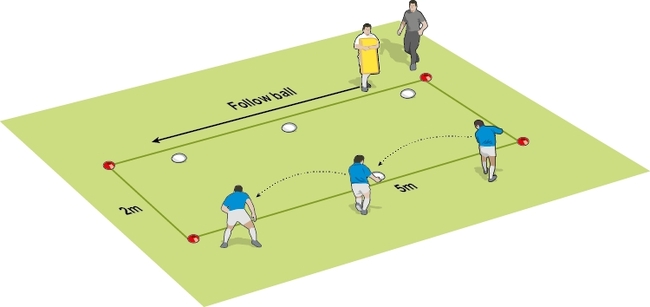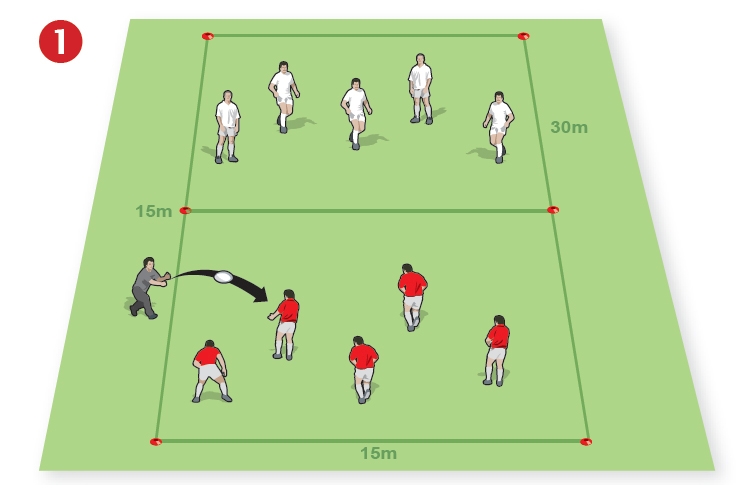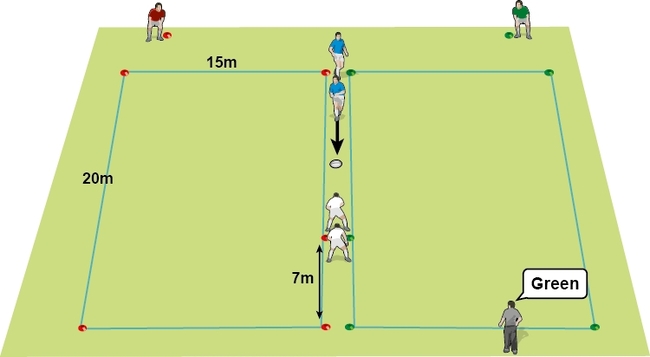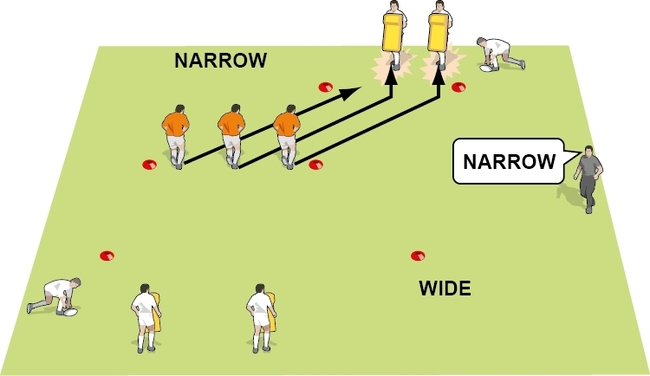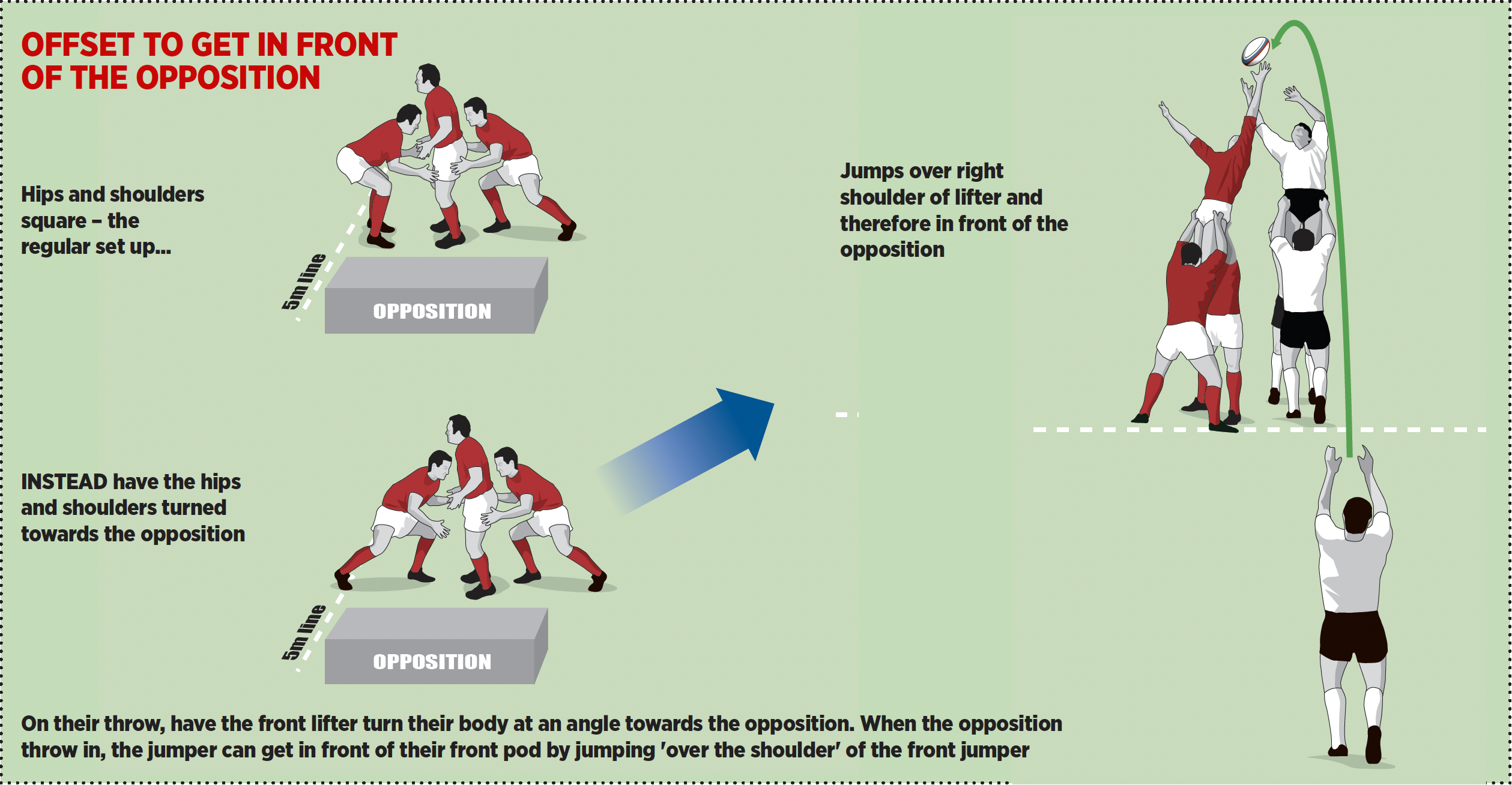Three zone touch: Training the "apply pressure" principle of play
Small-Sided Gamesby Ged Hall
Applying pressure is an often-misunderstood principle of play, with coaches often equating it to scoring points in attack or turning a ball over in defence. Whilst applying pressure will commonly be the precursor to these actions, the principle relates more to the exploitation of time and space in attack, and the denial of these in defence. In the following game, we look to explore these ideas.
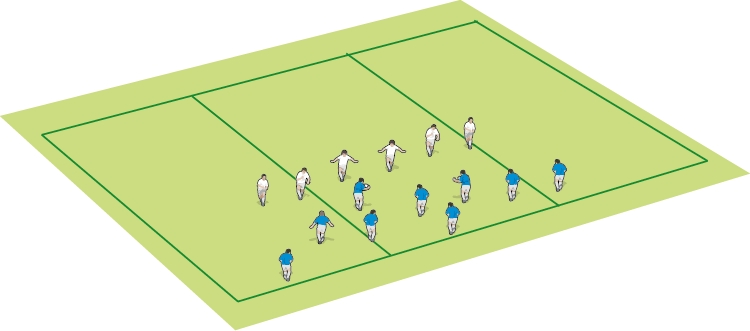
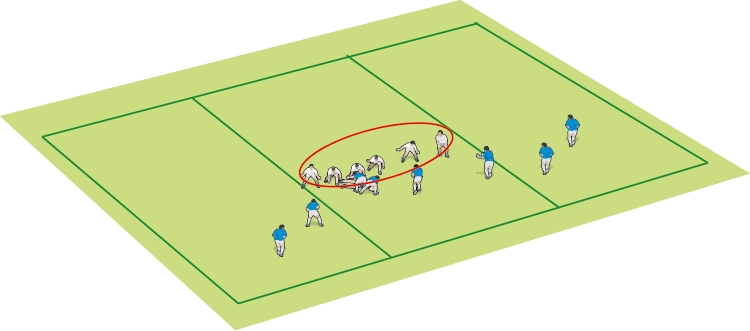
In attack, this game encourages players to explore the space afforded by the defence having to condense into one area of the pitch, while also having a numeric advantage. The attack will need to exploit the space left by the defence while also working out how to best use or create time on the ball.
In defence, the game encourages players to take away easy attacking options and force the attack to have to explore riskier options to score.
Use a mix of coaching skills here to check for understanding. First and foremost, observe the game, see what's happening. Ask players questions, either quickly during play or at opportune breaks.
Is the team looking to exploit the space on the pitch?
Are the team able to manipulate the time they have in attack by choosing whether to use depth or attack flatter to the ball?
Are players working off the ball to apply pressure on the defence?
Is the defence working to take away easy options in the attack?
Are the defence forcing the attack to play in certain areas, for example, denying the opportunity to split the field?
Are defenders identifying the correct times to drift or ‘bite in’?
When changing the game be sure about why you are doing it – work towards a goal.
Tackling: Introducing tackling into this game will create several different situations. For defenders, their technical ability to tackle will be challenged. With a tackle, attackers might have greater ability to use offloads, this may in turn challenge defenders to be aware of passes coming back on the inside.
Defensive Markers: When there is a tackle, one defender can choose to stay outside of the zone with the rest of the defence. This player might be enough of a distraction to make the attacking team alter the way in which they attack. For the defence the role this player takes may vary on the approach the defence wish to take – this player may look to aggressively challenge the attack, or may drift early.
Transitions: If a ball is dropped and the defence are able to pick it up, they can play for a limited number of phases as an attacking team. In this version of the game, players explore how to flip from applying pressure in attack to defence and vice versa.
After playing this game, players should begin to develop an understanding of the principles of applying pressure. If possible, observe another game to see if the lessons from this game are transferred to others.
Reiterate the critical points for both attack and defence. If there are areas where there is a skill lacking which could assist with the game, for example, the inability to run on to the ball at pace) work on these independently and revisit the game another session.
Next session, check if the players have retained the understanding of the principles of the game, either through questions or demonstration in another game. Remember that learning is a long term process, just playing this game once will not create players capable of applying pressure consistently.
THREE ZONE TOUCH

- Split into two teams with an attacking overload.
- On a pitch size suitable for the age and experience for your players mark out three zones across the pitch.
- The attacking team has unlimited touches and are trying to score as many tries as possible within a time limit.
- On a score, the attacking team turns and attacks the opposite try line.
- If there is a knock-on or forward pass the attack restart from the last try line they scored on.

- On a touch, the ball carrier goes to the ground and two supporting players go over to simulate a ruck.
- All defenders must be onside and in the zone where the touch takes place or they are considered ‘offside’.
- The defenders may spread when the ball is played. The attack can be positioned in any zone they choose.
WHY PLAY THE GAME
In attack, this game encourages players to explore the space afforded by the defence having to condense into one area of the pitch, while also having a numeric advantage. The attack will need to exploit the space left by the defence while also working out how to best use or create time on the ball.
In defence, the game encourages players to take away easy attacking options and force the attack to have to explore riskier options to score.
CHECKING FOR UNDERSTANDING
Use a mix of coaching skills here to check for understanding. First and foremost, observe the game, see what's happening. Ask players questions, either quickly during play or at opportune breaks.
IN ATTACK
Is the team looking to exploit the space on the pitch?
Are the team able to manipulate the time they have in attack by choosing whether to use depth or attack flatter to the ball?
Are players working off the ball to apply pressure on the defence?
IN DEFENCE
Is the defence working to take away easy options in the attack?
Are the defence forcing the attack to play in certain areas, for example, denying the opportunity to split the field?
Are defenders identifying the correct times to drift or ‘bite in’?
CHANGING THE GAME
When changing the game be sure about why you are doing it – work towards a goal.
Tackling: Introducing tackling into this game will create several different situations. For defenders, their technical ability to tackle will be challenged. With a tackle, attackers might have greater ability to use offloads, this may in turn challenge defenders to be aware of passes coming back on the inside.
Defensive Markers: When there is a tackle, one defender can choose to stay outside of the zone with the rest of the defence. This player might be enough of a distraction to make the attacking team alter the way in which they attack. For the defence the role this player takes may vary on the approach the defence wish to take – this player may look to aggressively challenge the attack, or may drift early.
Transitions: If a ball is dropped and the defence are able to pick it up, they can play for a limited number of phases as an attacking team. In this version of the game, players explore how to flip from applying pressure in attack to defence and vice versa.
MOVING FORWARD
After playing this game, players should begin to develop an understanding of the principles of applying pressure. If possible, observe another game to see if the lessons from this game are transferred to others.
Reiterate the critical points for both attack and defence. If there are areas where there is a skill lacking which could assist with the game, for example, the inability to run on to the ball at pace) work on these independently and revisit the game another session.
Next session, check if the players have retained the understanding of the principles of the game, either through questions or demonstration in another game. Remember that learning is a long term process, just playing this game once will not create players capable of applying pressure consistently.
Newsletter Sign Up
Coaches Testimonials

Gerald Kearney, Downtown Las Vegas Soccer Club

Paul Butler, Florida, USA

Rick Shields, Springboro, USA

Tony Green, Pierrefonds Titans, Quebec, Canada
Subscribe Today
Be a more effective, more successful rugby coach
In a recent survey 89% of subscribers said Rugby Coach Weekly makes them more confident, 91% said Rugby Coach Weekly makes them a more effective coach and 93% said Rugby Coach Weekly makes them more inspired.
Get Weekly Inspiration
All the latest techniques and approaches
Rugby Coach Weekly offers proven and easy to use rugby drills, coaching sessions, practice plans, small-sided games, warm-ups, training tips and advice.
We've been at the cutting edge of rugby coaching since we launched in 2005, creating resources for the grassroots youth coach, following best practice from around the world and insights from the professional game.

